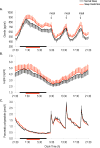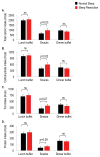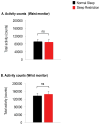Elevated ghrelin predicts food intake during experimental sleep restriction
- PMID: 26467988
- PMCID: PMC4688118
- DOI: 10.1002/oby.21321
Elevated ghrelin predicts food intake during experimental sleep restriction
Abstract
Objective: Sleep curtailment has been linked to obesity, but underlying mechanisms remain to be elucidated. This study assessed whether sleep restriction alters 24-h profiles of appetite-regulating hormones ghrelin, leptin, and pancreatic polypeptide during a standardized diet and whether these hormonal alterations predict food intake during ad libitum feeding.
Methods: Nineteen healthy, lean men were studied under normal sleep and sleep restriction in a randomized crossover design. Blood samples were collected for 24 h during standardized meals. Subsequently, participants had an ad libitum feeding opportunity (buffet meals and snacks) and caloric intake was measured.
Results: Ghrelin levels were increased after sleep restriction as compared with normal sleep (P < 0.01). Overall, sleep restriction did not alter leptin or pancreatic polypeptide profiles. Sleep restriction was associated with an increase in total calories from snacks by 328 ± 140 kcal (P = 0.03), primarily from carbohydrates (P = 0.02). The increase in evening ghrelin during sleep restriction was correlated with higher consumption of calories from sweets (r = 0.48, P = 0.04).
Conclusions: Sleep restriction as compared with normal sleep significantly increases ghrelin levels. The increase in ghrelin is associated with higher consumption of calories. Elevated ghrelin may be a mechanism by which sleep loss leads to increased food intake and the development of obesity.
© 2015 The Obesity Society.
Conflict of interest statement
The authors have no conflicts of interest to disclose.
Figures





Comment in
-
Impact of sleep duration on food intake regulation: Different mechanisms by sex?Obesity (Silver Spring). 2016 Jan;24(1):11. doi: 10.1002/oby.21374. Epub 2015 Dec 5. Obesity (Silver Spring). 2016. PMID: 26638188 Free PMC article. No abstract available.
References
Publication types
MeSH terms
Substances
Grants and funding
- UL1 TR000430/TR/NCATS NIH HHS/United States
- P60-DK20595/DK/NIDDK NIH HHS/United States
- P50-HD057796/HD/NICHD NIH HHS/United States
- P41 RR013642/RR/NCRR NIH HHS/United States
- P30 DK020595/DK/NIDDK NIH HHS/United States
- R01-HL-075079/HL/NHLBI NIH HHS/United States
- R01 HL086459/HL/NHLBI NIH HHS/United States
- P01-AG11412/AG/NIA NIH HHS/United States
- CTSA-UL1 TR000430/TR/NCATS NIH HHS/United States
- P50 HD057796/HD/NICHD NIH HHS/United States
- R01 HL075079/HL/NHLBI NIH HHS/United States
- P60 DK020595/DK/NIDDK NIH HHS/United States
- P01 AG011412/AG/NIA NIH HHS/United States
LinkOut - more resources
Full Text Sources
Other Literature Sources

